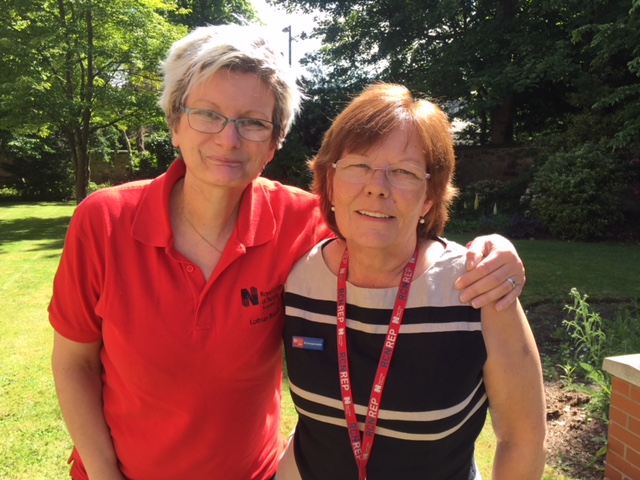Janette Astles became a learning rep earlier this year. She’s now part of a pilot team in Scotland that’s looking at what sort of support and supervision learning reps and safety reps need.
Along with three other pilot teams from across the UK, their recommendations will help to establish a set of supervision standards to make sure learning reps and safety reps are getting structured support from their local senior officers and the RCN.
“Historically stewards tend to have more frequent communication and support from senior officers as they’re working on cases,” explains Janette.
“This project is about making sure learning reps and safety reps are getting regular support too but it’s also about encouraging and promoting joint working between the different types of reps. We want to highlight the benefits joint working can bring.”
We struck up an immediate bond and recognised early on that there are so many advantages to collaborative working between all reps
At the first project meeting in February 2018, Janette met Linda Rumbles. Linda is a steward and safety rep. She told Janette about a case she was working on that she thought could use the help of a learning rep.
Janette says: “We struck up an immediate bond and recognised early on that there are so many advantages to collaborative working between all reps.
“We decided to try out the idea of a learning rep working closely with a steward to support a specific case. We captured evidence of what we did and accessed joint supervision to share and learn from our experiences.”

Collaborative working
With permission from the member and an enthusiastic response from management, Linda sent Janette a copy of the member’s action plan.
After looking through this, Janette contacted the member and arranged a meeting to discuss some of the issues from the member’s point of view.
“I knew in advance that there were definitely some issues around communication,” says Janette. “I thought that some development in that area would be beneficial so in advance of the meeting I printed some articles – many from RCN publications – about communication skills.
“I gave these to the member to read in her own time after our meeting but I was also able to offer some support and assistance there and then, and perhaps, most significantly, I was able to signpost the member elsewhere for further help.
“In our meeting, for the first time, the member explained that they had dyslexia which has a big impact on their written communication.
“I suggested that they contact occupational health as they would be able to offer practical help with this.”
It was really rewarding to know that my input had been helpful. Working on this case also gave me a better insight into the work of stewards
Janette points out that as well as supporting the member to improve their communication skills, this would also show the employer they were trying hard to address the issues that had been raised in competency discussions.
Janette continues: “Concluding the meeting, I reassured the member that they could contact me directly for further advice if they wanted to. In the end the case took a different turn because the member changed roles but it was really rewarding to know that my input had been helpful.
“As learning reps, we may be in a position to step in and work towards solving issues early on, preventing them from escalating and needing steward input. Working on this case also gave me a better understanding and insight into the work of stewards.”
At the moment learning reps and safety reps don’t have access to the case management system (CMS) so they’re not able to record their work on cases as stewards do.
Instead Janette recorded her activity in a simple template – logging her actions and the outcomes. Due to General Data Protection Regulations (GDPR) Janette didn’t keep a copy of this but she shared it with her senior officer who was able to input the information securely into the CMS.
Structured support
Janette says: “This project has shown me how beneficial regular supervision and support would be. Just knowing that the support is there makes a big difference. You feel more confident.
“Primarily, it’s about knowing I’m doing the job right. As a relatively new learning rep, my concern was that I would be going down the track that I thought was right and would only find out it was wrong much later on. I’ve had two meetings with my senior officer as part of this project and it’s great to have that reassurance that I’m doing the right thing.
“If I do need any help or support, I can go to my senior officer on a formal footing and say this is what I’d like help with or this is what I’d like to do, and then we’ll work together to make sure I get the support to do it. It’s a bit like an appraisal.
This ongoing support will benefit everyone – reps, members and officers.
“I’ve also found out about a lot of meetings or working groups that I can attend that I wouldn’t have had the chance to access otherwise.
“I’m looking forward to my work as a learning rep with renewed enthusiasm knowing that support and supervision will be in place to help guide me all the time, not just when I or my supervising officers feel I need it. This ongoing support will benefit everyone – reps, members and officers.”
Jonathan Bowker, RCN Member Representation and Support Programme Lead, says: “We hope that this project will make the contact that learning reps and safety reps have with their senior officers more meaningful. All reps will know what level of support to expect and have clear development goals. We’re looking at how we can better support collaborative working too.”
More information
A set of standards clearly setting out the level of support and supervision that learning reps and safety reps can expect to receive will be finalised early next year. Look out for more details in Activate and on the RCN reps hub.








